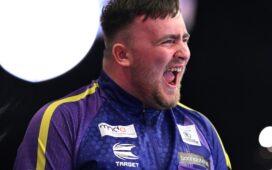It was broadly hushed up last Sunday but Harry Kane was not in the original Tottenham line-up for the Premier League fixture against Crystal Palace. He then underwent a late fitness test on an unspecified problem, felt he could pull through and told José Mourinho so.
Equipped with this information Mourinho did what he almost always does, what Mauricio Pochettino did before him at Spurs and what Gareth Southgate also does whenever possible with England – he started Kane. The centre-forward would register two goals and two assists in the 4-1 win.
Spool forward to Thursday night and another important game – the Europa League last 16, first leg against Dinamo Zagreb. Kane started, scored twice and was substituted on 84 minutes of what would finish as a 2-0 victory. When Kane sat down in the dugout, a club medic promptly affixed possibly the biggest ice pack ever seen to his right knee. Cue panic among the Spurs support, albeit only briefly. Kane would remove the ice before full time and Mourinho later said that he would be OK for Sunday’s derby at Arsenal.
It was only at the end of January that Kane injured both of his ankles against Liverpool, one worse than the other, to be forced off at half-time. There were fears of a three-week absence but he was back after 10 days to score the opening goal in the 2-0 defeat of West Bromwich Albion. Spurs lost the two games that he missed against Brighton and Chelsea – each by a 1-0 scoreline.
It is stating the obvious to say Kane is fundamental to Spurs’s hopes. When he has been a substitute in the domestic cups this season, the ties have been in the balance each time and Mourinho has always sent him on. The manager also started him in two of the three Europa League qualifiers, which were knockout games, and introduced him as a substitute in the other, at Shkendija, when it was 1-1.
The sense in recent weeks is that Kane is beginning to feel the strain on his body and Mourinho’s management of his minutes has become a topic for forensic analysis. How does he do it from here on? During the Europa League group phase, he was able to use Kane mainly as a substitute or not at all while he got through both legs of the last 32 against the Austrian minnows, Wolfsberger, without him.

But as the season enters its defining weeks, there do not seem to be many more games in which Mourinho would be comfortable to omit Kane. Perhaps next Thursday’s second leg against Dinamo could be one. There are three at the end of the month that Mourinho would choose, although they are England’s World Cup qualifiers against San Marino, Albania and Poland. It is doubtful Southgate would see it the same way and so expect a bit more back-and-forth between the pair.
What is clear is that Kane has had and will continue to have a decisive say over how he feels and his readiness to play. The problem would come if his determination to be involved and the responsibility he embraces were to obscure common sense, and the impression has long been that Kane will always put his hand up for every minute; he will run and run until he drops. Mourinho insists that the approach is collaborative but the risks and edginess are pronounced.
“Harry had a little knock the day before [the Palace game] … we had everybody fit in the team, we don’t want to risk players,” Mourinho said, when asked about Kane’s original absence last Sunday. “We wanted to give a 100% guarantee that by playing he wouldn’t affect the near future. We did just a little, if you want to call it a test or a little thing, just to make sure that he was right for the game and he was.
“Was it Harry saying: ‘Play me?’ Yes. Of course. Like everyone. With me, players make these decisions. When a player is a doubt … I trust the player more than anything and the relationship that we have between coaching staff, medical staff and players is a very professional relationship. But the players’ feelings are very important.”
A related point – poor Carlos Vinícius. It is unclear whether the striker needed to be stood down for Palace but he is sure to have been disappointed to have featured only for six minutes against Dinamo as Kane’s replacement, having generally started in the Europa League when available. If Vinícius did not appreciate the tough reality of being Kane’s back-up when he signed on loan from Benfica last October, he does now.
Mourinho denied that Kane’s desire to play every minute was a problem, but he then veered off on a significant tangent. “The most difficult part of it … and that’s the reason why I love Vinícius … is to have a very good striker that doesn’t play many minutes and keeps motivated and working hard and fit and ready to help the team. So my special words go to Vinícius because he is a very good player and an amazing guy in the group.
“When you have a striker like Harry, that doesn’t affect only in terms of goals scored but also the quality and dynamic of the team. We know that he has important routines [link-ups] built with other players and it’s difficult to leave him out.”
And so to the derby, a fixture in which Kane is the record scorer; he has 11 goals in 14 appearances. Vinícius will be ready. All eyes will be on Kane.




